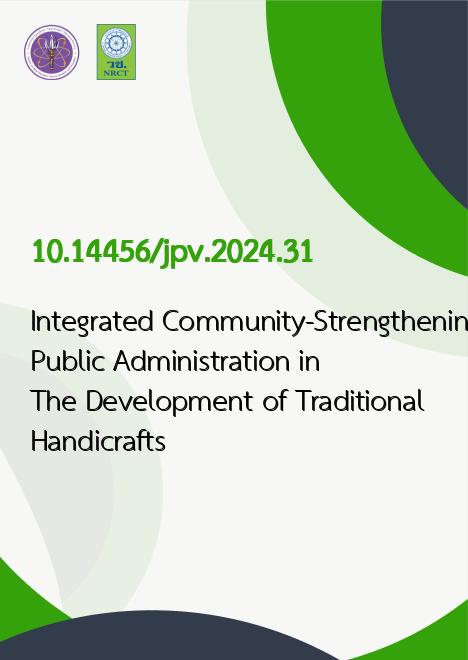
|
Integrated Community-Strengthening Public Administration in The Development of Traditional Handicrafts |
|---|---|
| รหัสดีโอไอ | |
| Creator | Pornphan Tasanapanon |
| Title | Integrated Community-Strengthening Public Administration in The Development of Traditional Handicrafts |
| Publisher | Mahamut Buddhist University |
| Publication Year | 2567 |
| Journal Title | Journal of Philosophical Vision |
| Journal Vol. | 29 |
| Journal No. | 2 |
| Page no. | 110-123 |
| Keyword | Integrated Public Administration, Development of Traditional Handicrafts, Community’s Strength, Local Wisdom |
| URL Website | https://so05.tci-thaijo.org/index.php/phiv |
| Website title | https://so05.tci-thaijo.org/index.php/phiv/article/view/265632 |
| ISSN | 15136620 |
| Abstract | The purpose of this qualitative research was to examine the community's strength as a consequence of local wisdom and traditional handicrafts in Sri Suphan Community, Chiang Mai Province, Ban Phai Nong Community, Phra Nakhon Si Ayutthaya Province, and the urban community of Nakhon Si Thammarat Province; and to examine the role of integrated public administration in the development of local wisdom and traditional Thai handicrafts. The forty-five key informants include community leaders, government officials, and members of the community. The findings revealed that the strength of indigenous knowledge, as exemplified by traditional handicrafts, is derived from the accumulated wisdom of past generations that has been acquired through empirical research and transmitted intergenerationally within the community. Additionally, the resilience of the community is bolstered by its ability to be self-sufficient, which is further reinforced by governmental assistance. In the context of production, adaptation, and modernization, there exists a potential for value addition, job creation, income generation, and enhancement of community happiness and pride. Consequently, the sustainable strengthening of the community is achieved. In addition, it was discovered that an integrated approach to public administration in the development of traditional handicraft local knowledge is the result of the public sector's participation in all phases of development, namely: 1) establishing mechanisms to promote diverse group representatives formally adhering; 2) adapting government agencies and agency officials' working methods to a network environment; 3) creating skills to collaborate with all sectors and fostering leadership for the public sector to be educated about management techniques; and 4) evaluating performance from working with people in order to achieve results in accordance with the strategy aimed at achieving the objectives of collaborative work. |